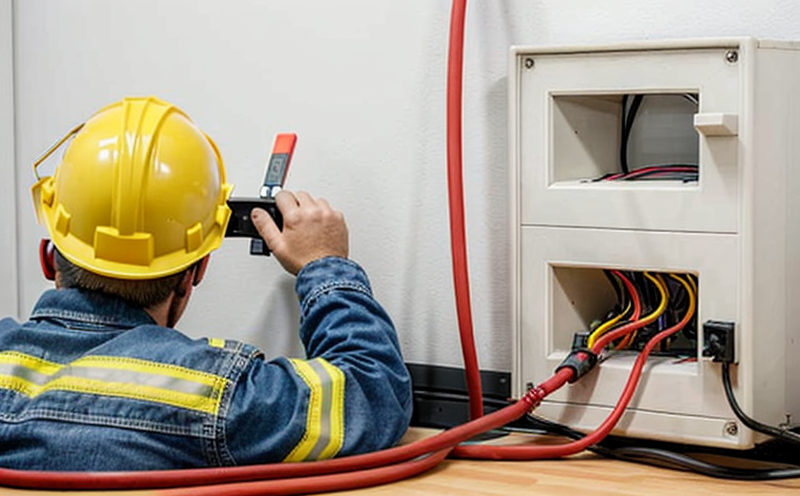Simulating electrical faults or failures to assess the risk of electrical shock or fire in consumer products
Simulating Electrical Faults to Assess Risk Ensuring Consumer Safety with Eurolabs Expertise
In todays fast-paced world of consumer product innovation, manufacturers are under constant pressure to meet strict safety regulations and standards while delivering products that exceed customer expectations. One critical aspect of ensuring consumer safety is assessing the risk of electrical shock or fire in various products, from household appliances to industrial equipment. This is where Simulating electrical faults or failures to assess the risk of electrical shock or fire comes into play a laboratory service offered by Eurolab that helps businesses safeguard their customers and reputation.
What is Simulating Electrical Faults?
Simulating electrical faults involves recreating various types of faults in electrical systems, such as short circuits, overheating, or insulation breakdowns, to evaluate the likelihood of electrical shock or fire. This process enables manufacturers to identify potential weaknesses and defects in their products before they reach the market, thereby preventing accidents and ensuring compliance with regulatory requirements.
The Importance of Simulating Electrical Faults
Assessing the risk of electrical shock or fire is essential for businesses due to several reasons
Compliance with Regulations Governments worldwide have implemented strict safety regulations to protect consumers from electrical hazards. Manufacturers must adhere to these standards to avoid fines, penalties, and damage to their reputation.
Consumer Safety The primary concern for any business should be the well-being of its customers. Simulating electrical faults helps identify potential risks, enabling manufacturers to rectify defects and prevent accidents.
Cost Savings Identifying issues early on can significantly reduce costs associated with product recalls, litigation, and damage to property or lives.
Advantages of Using Eurolabs Simulating Electrical Faults Service
By partnering with Eurolab for simulating electrical faults, manufacturers can benefit from
Key Benefits
Improved Safety Our expert technicians recreate various fault scenarios to assess the risk of electrical shock or fire, ensuring that products meet strict safety standards.
Enhanced Compliance We help manufacturers demonstrate compliance with regulatory requirements, reducing the risk of fines and penalties.
Cost Savings By identifying issues early on, businesses can avoid costly product recalls, litigation, and damage to property or lives.
Increased Efficiency Our laboratory service streamlines the testing process, allowing manufacturers to get products to market faster while maintaining quality and safety standards.
Expertise Eurolabs team of experts has extensive knowledge in electrical engineering, ensuring that simulations are conducted accurately and efficiently.
QA Section
Q What types of products can be simulated for electrical faults?
A Our laboratory service is applicable to a wide range of consumer products, including household appliances, industrial equipment, and electronic devices.
Q How long does the simulation process take?
A The duration of the simulation process varies depending on the complexity of the product and the type of fault being simulated. Our team will provide a detailed timeline for each project.
Q What is the benefit of simulating electrical faults compared to traditional testing methods?
A Simulating electrical faults offers a more accurate and efficient way to assess risk, as it recreates various fault scenarios in a controlled laboratory environment.
Conclusion
In conclusion, simulating electrical faults or failures to assess the risk of electrical shock or fire is an essential service for businesses seeking to ensure consumer safety and comply with regulatory requirements. By partnering with Eurolab, manufacturers can benefit from improved safety, enhanced compliance, cost savings, increased efficiency, and expert knowledge. Dont wait until its too late choose Eurolab for your simulating electrical faults needs and safeguard your customers, reputation, and bottom line.
Discover More About Eurolabs Expert Services
At Eurolab, we pride ourselves on delivering high-quality laboratory services that meet the evolving needs of manufacturers in various industries. Our team of experts is dedicated to providing innovative solutions that ensure consumer safety while driving business success. For more information about our simulating electrical faults service or other laboratory offerings, please visit our website.
Stay ahead of the competition by choosing Eurolab as your trusted partner for laboratory services. Contact us today to learn how we can help you safeguard your customers and reputation!
-
Evaluating the electrical safety of consumer products to prevent shock, short circuits, or fires
-
Testing the insulation and grounding of electrical components in household appliances and electronics
-
Verifying the compliance of electrical products with safety standards to prevent electric hazards
-
Testing the protection mechanisms in place to ensure safe operation of electrical circuits in devices
-
Assessing the effectiveness of circuit breakers, fuses, or other safety devices in electrical products
-
Simulating accidental electrical surges or power failures to test the resilience of devices
-
Testing the resistance of electrical wiring and components to wear and degradation over time
-
Evaluating the safe handling of electrical products, including exposed wires or connections
-
Testing for the durability and safety of electrical connectors, plugs, and sockets used in consumer products
-
Ensuring that products have proper earthing and insulation to protect users from electric shock
-
Verifying that electrical appliances are free from harmful electromagnetic interference (EMI) or electromagnetic fields (EMF)
-
Testing the performance of safety features like thermal fuses or automatic shut-off systems in electrical products
-
Assessing electrical safety in battery-powered consumer goods to ensure they do not overheat or cause fires
-
Testing the integrity of electrical shielding or covers to prevent accidental contact with live parts
-
Verifying that products comply with global electrical safety certifications and standards
-
Assessing the durability of electrical components under conditions such as humidity, heat, or vibration
-
Simulating long-term usage to test the reliability of electrical systems in consumer devices
-
Testing the protection of user interfaces like buttons or screens from electrical risks
-
Evaluating the safety of electrical power supplies used in consumer goods like kitchen appliances or power tools
-
Ensuring that electrical systems in products are adequately tested for shock, fire, and overload protection




